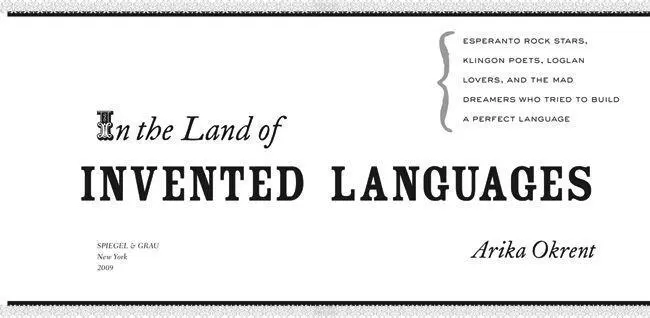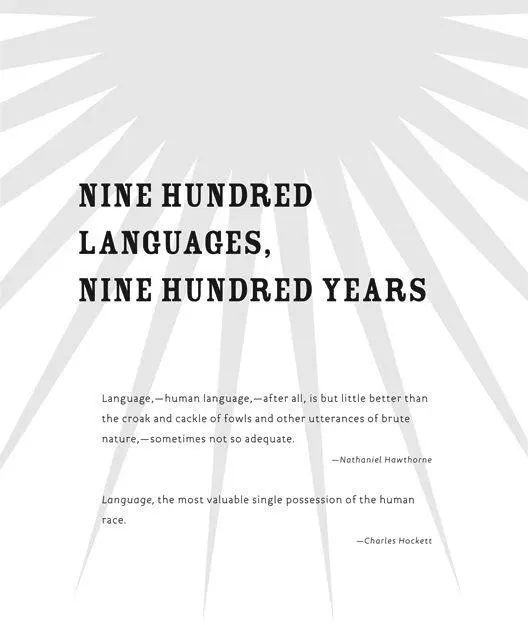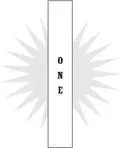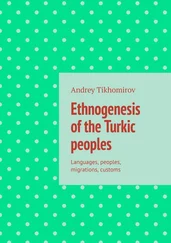To Derrick

Nine Hundred Languages, Nine Hundred Years


Klingon speakers, those who have devoted themselves to the study of a language invented for the Star Trek franchise, inhabit the lowest possible rung on the geek ladder. Dungeons & Dragons players, ham radio operators, robot engineers, computer programmers, comic book collectors—they all look down on Klingon speakers. Even the most ardent Star Trek fanatics, the Trekkies, who dress up in costume every day, who can recite scripts of entire episodes, who collect Star Trek paraphernalia with mad devotion, consider Klingon speakers beneath them. When a discussion of Klingon appeared on Slashdot.org —the Web site billed as “News for Nerds”—the topic inspired comments like “I’m sorry but it’s people like this that give science fiction a bad name.” Another said that Klingon speakers “provide excellent reasons for forced sterilization. Then again being able to speak Klingon pretty much does this without surgery.”
Mark Shoulson, who has a wife and two children, doesn’t enjoy being talked about this way. “It’s okay to laugh about it, because it’s funny. It’s legitimate to laugh. Klingon has entertainment as part of its face value. But I do get annoyed at some of the ruder stuff.” Mark was my unofficial guide to the world of Klingon. When I met him, we lived in the same New Jersey town. I discovered this browsing the Internet, where I also found that he was assistant director of the Klingon Language Institute (KLI) and editor of the Klingon translation of Hamlet . I wrote him, and he e-mailed me back the same day, saying he was so excited by the prospect of another Klingon speaker so close by that he didn’t even finish reading my message before he responded.
I wasn’t yet a Klingon speaker, and I wasn’t really planning on becoming one. I was a linguist who had developed a side interest in the subject of artificial languages, and I wanted to talk to Mark for research purposes. People really spoke Klingon—so claimed the Klingon Language Institute materials anyway—and I wasn’t sure what that meant. When people “spoke” Klingon, was it playacting? Spitting out little words and phrases and putting on a show? A charades-like guessing game where someone sort of cobbled together a message and someone else sort of understood it? Or was it actual language use?
If it was the latter, then this was something I needed to see for myself, because that would make Klingon something so remarkable as to be almost unheard of—a consciously invented language that had been brought to life.
Although we like to call language mankind’s greatest invention, it wasn’t invented at all. The languages we speak were not created according to any plan or design. Who invented French? Who invented Portuguese? No one. They just happened. They arose. Someone said something a certain way, someone else picked up on it, and someone else embellished. A tendency turned into a habit, and somewhere along the way a system came to be. This is how pidgins, slangs, and dialects are born; this is the way English, Russian, and Japanese were born. This is the way all natural languages are born—organically, spontaneously.
The variety of shape, pattern, and color found in the languages of the world is a testament to the wonder of nature, to the breathtaking array of possibilities that can emerge, tangled and wild, from the fertile human endowments of brain and larynx, intelligence and social skills. The job of the linguist, like that of the biologist or the botanist, is not to tell us how nature should behave, or what its creations should look like, but to describe those creations in all their messy glory and try to figure out what they can teach us about life, the world, and, especially in the case of linguistics, the workings of the human mind.
In libraries organized according to the Library of Congress call number system, linguists can usually be found in the stacks classified in the first half of the Ps, anywhere from subclass P, which covers general linguistics, to subclass PN, where “literature” starts. When I was in graduate school, I used to wander this territory, in a procrastinatory haze, noting how the languages covered by the intervening categories became more and more “exotic” the farther I got from PA (Greek and Latin). I would first pass through aisles and aisles of Romance languages, then Germanic, Scandinavian, English, Slavic. There at the end of the Slavic section, at PG9501, things would start to get interesting, with Albanian, followed by the offerings of PH—the Finno-Ugrics (Veps, Estonian, Udmurt, Hungarian), the mysterious Basque. By the time I got to PL, I would be far from Europe, drifting through Asia and Africa, lingering over A Grammar of the Hoava Language, Western Solomons or The Southern Bauchi Group of Chadic Languages: A Survey Report .
The final subclass, PM, was a tour through the New World, starting with the Eskimo languages of Greenland and Alaska and proceeding southward through Tlingit, Kickapoo, and Navajo to the Mayan and Aztecan languages of Mexico and Central America, down across the Amazon, through the Andes and the plains of Brazil, until I reached the islands off the southernmost tip of South America with Yámana-English: A Dictionary of the Speech of Tierra del Fuego . From there, there was nowhere to go but to the borders of language itself—the contact, or “mixed,” languages, the pidgins and creoles of the PM7800s: Spanish Contact Vernaculars in the Philippine Islands; Le Créole de Breaux Bridge, Louisiane: étude morphosyntaxique, textes, vocabulaire .
At the very end of this lush orchid garden of languages there was one more section, where linguists don’t generally care to visit—a few lonely shelves of faded plastic flowers, the artificial languages. The Klingon Dictionary was here, among other books on languages I had never heard of: Babm, aUI, Nal Bino, Leno Gi-Nasu, Tutonish, Ehmay Ghee Chah. These were not lighthearted language games, like pig Latin, or the spontaneous results of in-group communication, like Cockney rhyming slang or surfer jargon. They were invented on purpose, cut from whole cloth, set down on paper, start to finish, by one person. They had chapters and chapters of grammar and extensive dictionaries. They were testaments not to the wonder of nature but to the human impulse to master nature. They were deliberate, painstakingly crafted attempts to tame language by making it more orderly, more rational, less burdened with inconsistencies and irregularities. There were hundreds of them. And they were all failures, dead in the water, spoken by no one.
Well, of course they were. If you plant a plastic flower, will it grow? So I was skeptical about the claims that Klingon— Klingon ?—had really defied the odds and sprouted roots. In the name of research, I registered for the annual Klingon conference, or qep’a' , to occur in Phoenix at the end of the summer. I wanted to be prepared, and so I arranged to meet with Mark.
For our first meeting Mark showed up in a T-shirt with the International Phonetic Alphabet printed on it, and I soon discovered that all his T-shirts were a form of self-expression. In fact, everything he owns somehow advertises his interests to the world. On his minivan he has a KLI license plate holder and an LNX sticker (proclaiming himself a user of the Linux operating system). On the vest he wears most days, he displays his three Klingon certification pins; membership pins for the Dozenal Society (“they advocate switching to a base 12 system from the base 10 system we use for numbering”), Mensa (“it’s a way for insecure people to feel better about themselves”), and the Triple Nine Society (“a more extreme kind of Mensa”); and a button he made that says “If you can read this you are standing too close” in Braille.
Читать дальше















